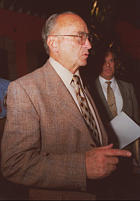

JULY 02, 07:57 ET
http://wire.ap.org/?FRONTID=CSA&SLUG=MEXICO%2dPAST%2dCRIMES
By MARK STEVENSON
Associated Press Writer
 |
MEXICO CITY (AP) — For decades, Luis Echeverria — like most of Mexico's
former presidents — has lived in a velvet world of luxury, largely insulated
from street-level resentment of the repression and political corruption of his
administration.
But sources close to an independent investigation said the former president has been sent a summons to testify Tuesday about his alleged role in a paramilitary massacre of 30 student demonstrators in 1971. A spokeswoman for the special prosecutor said she couldn't confirm the report.
``Now he's just like any other citizen. Prosecutors have a duty to call him in, and he has to go,'' said Ignacio Burgoa, one of Mexico's foremost legal scholars.
The investigation by the special prosecutor — appointed by President Vicente Fox in January — is reminiscent of efforts to try Chilean Gen. Augusto Pinochet for crimes associated with Chile's 1973 military coup.
The case is a measure of how Fox and the courts are increasingly chipping away at a structure in which former presidents were largely left alone by courts, congress and the press despite widespread allegations of corruption and other wrongdoing.
Rarely has a former president been summoned to testify about crimes allegedly committed during the 71-year rule of the Institutional Revolutionary Party, or PRI, which was ousted from the presidency in 2000. In 1996, disgraced former President Carlos Salinas testified from self-imposed exile in Ireland about the 1994 murder of a presidential candidate.
``This is a big test of the fight against impunity,'' historian Lorenzo Meyer said. Echeverria, he added, ``hasn't got political power any more, but he has money and impunity.''
The June 10, 1971, slayings have come to be known as the ``Corpus Cristi massacre'' after the Roman Catholic holiday on which it occurred.
Thirty students were gunned down on a Mexico City street while demonstrating in what historians describe as an attempt by Echeverria to prevent a resurgence of a radical students' movement that had been crushed years earlier by a military massacre.
``These men hurt a lot of people, and a moral judgment against them is not enough,'' said historian Enrique Condes Lara, who filed a criminal complaint after unearthing evidence he claims shows that Echeverria knew about the 1971 killings as they were being carried out.
Echeverria allegedly received reports from the field as government-organized thugs beat and shot the students.
Condes Lara said he also wants to go after Jose Lopez Portillo, who as Echeverria's successor from 1976-82 continued the ``dirty war'' against the small radical leftist groups fighting the government.
In November, the head of Mexico's Human Rights Commission handed Fox a sealed envelope with the names of 74 former or current officials implicated in criminal acts related to political repression. The names were not made public.
Echeverria, meanwhile, seems unfazed. In 1998, he walked out to a picket line set up outside his mansion by eight mothers whose children had disappeared during his administration, and told them with a gentle smile, ``my conscience is clear.''
But Fox is opening secret government files and increasing public servants' obligation to report income and other details about their lives. Millions of old files were opened this month to public scrutiny.
In Echeverria's case, secret police during his administration produced a 700-page
report on the massacre that wound up in the National Archives. Condes Lara,
himself a political prisoner under Echeverria, found the report lying around
in an already-public section months before.